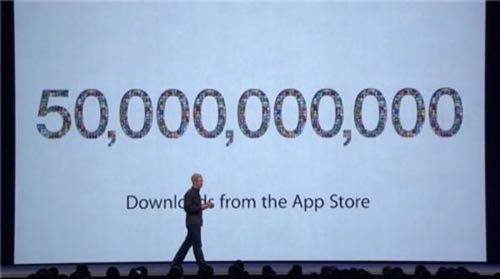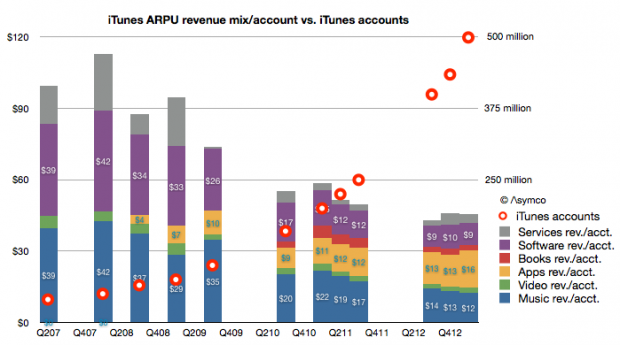
So let’s get this straight: both Samsung and Apple are soaring, with profits at all-time highs and a comfortable duopoly in the industry-defining mobile market. Cause for celebration, yes?
Well, no. Both companies have seen their share prices slide in recent months as their dramatic growth has shown signs of cooling, along with the broader mobile market. But as analysts downgrade the mobile market’s hottest players, they might want to remember a bit of computing history.
After all, if Microsoft’s PC experience is any indicator, owning a new computing market’s dominant platform will generate decades of outsized revenue.
Wall Street’s Curious Myopia
Samsung recently reported operating profits of $8.3 billion on $49.9 billion in revenue this quarter, up from $6.4 billion in Q2 2012. This represents 8% sequential growth, but comes in 6% to 8% shy of what analysts had been projecting. This fed analysts’ fears that the smartphone market is slowing. As IDC notes, the smartphone market grew just 12% in the last year to 31.6 million units shipped in the last quarter, representing its lowest growth rate since 2004.
That’s clearly bad.
How bad? Bad enough to send Apple’s stock price into a 30.5% freefall over the past year.

Samsung’s stock price, too, was battered after it preannounced record profits that also suggested a slowing growth rate.
As Neil Mawston, executive director of Strategy Analytics, posits, “Apple is suffering from iPhone fatigue, while Samsung is suffering from Galaxy fatigue.”
But is this “fatigue” justified?
Today’s Dominance = Revenue For Decades
Consider, for example, what an iPhone user is worth to Apple. Not only is there an immediate sale, but once a user is hooked on iOS they’re that much more likely to purchase another Apple product, be it an iPad or MacBook.
Due to the inherent app store lock-in, they’re also much more likely to buy apps, with a 30% cut going to Apple, and to spend around $40 per year on iTunes media purchases, according to Asymco.
That’s a lot of money, and it seems to be forgotten by Wall Street analysts that fixate on smartphone growth rates.
The numbers look even better if we delve into iTunes account growth. As Asymco highlights, iTunes accounts doubled from 2007 to 2009, then doubled again in 2010, again in 2011, and again in the following 18 months.

While the average revenue per account has declined from $99 to $40 in that same time period, this is reasonable given the shift away from highly committed early adopters to mainstream buyers. If we throw in the cost of devices, which is reasonable since Apple’s App Store and iTunes accounts tend to follow the purchase of Apple devices, then the average Apple user is worth roughly $300 per year to Apple, according to an Asymco analysis.
Now consider what would happen if Apple (or Samsung) figure out other services to sell to existing mobile customers? A bonanza that lasts for decades.
Learning From Microsoft
Just ask Microsoft, which once ruled 90% of the PC market, and continues to print profits in a market that few consider relevant anymore. Microsoft’s Windows monopoly turned into billions of dollars in Office revenue, and arguably positioned it to succeed in the enterprise market with SharePoint, Windows Server, SQL Server and more.
As I’ve noted before, revenue follows market share, which is why Google (and Samsung) has been so smart to focus on dominant market share even at the expense of near-term profits. Hence, so long as Samsung and Apple continue to own the mobile market, no matter its growth rate, they are setting themselves up to deliver outsized returns to investors for decades to come.
Wall Street analysts, focusing only on smartphone growth rates, seem to be missing this long-term view of the mobile market. Device sales are important, because they generate near-term profit but also because they set a firm up for long-term platform-related add-on revenue.

















